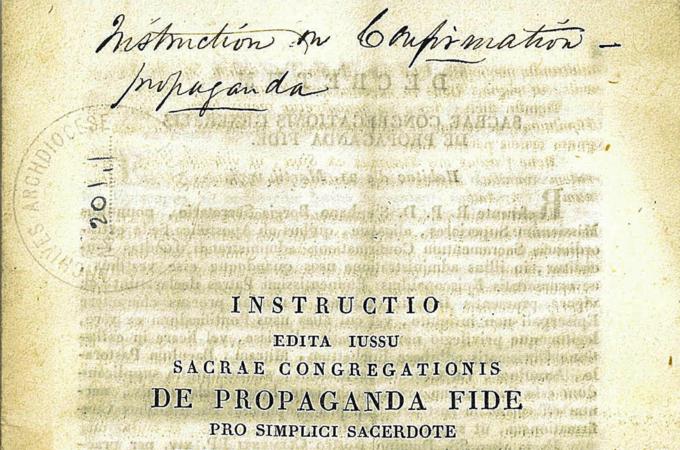Confirmation in Boston's missionary past
Many Catholics around the world will be receiving the sacrament of confirmation this month. While the sacrament is ordinarily conferred by a bishop, the Code of Canon Law (883-884) provides rules for exceptions to this, allowing for priests to confer the sacrament in certain circumstances.
For instance, it states that a priest with an appropriate pastoral office or a mandate from the diocesan bishop may confirm an adult at the time of his or her baptism. Another example is in the event of an emergency, when the recipient is at risk of death, even if he or she is not of age. Finally, a bishop may grant a priest this faculty intentionally, in essence extending his authority through another servant of the Church.
This last instance has been a practice for some time, as illustrated by a booklet located in the archive's manuscript collection, entitled "Instructio Edita Iussu Sacrae Congregationis de Propaganda Fide Pro Simplici Sacerdote Sacramentum Confirmationis ex Sedis Apostolicae Delegatione Administrante," dating to May 4, 1774. The title roughly translates to "Instructions Given by the Sacred Congregation of the Propagation of the Faith for Priests to Administer the Sacrament of Confirmation."
The booklet includes the text of the decree granting priests this faculty, and discusses the history and theology which were taken into consideration. It continues to discuss the conditions under which priests may exercise this extraordinary faculty, and even provides step-by-step instructions for administering the sacrament. Significantly, it states that although a priest may confer the sacrament upon an individual, he must use Chrism oil which has been consecrated by a bishop.
The Office of the Propagation of the Faith is responsible for missionaries and related activities. This pamphlet, we can surmise, provides guidelines for Catholic missionaries working in remote areas without the presence of a local bishop. The ability to confer the sacrament would be especially important to missionaries in the context of conversions, as confirmation more firmly binds an individual to the Church after baptism, to live by the lessons Jesus taught us, and spread his word.
In the context of New England Catholic history, in 1774 there was no formal worship beyond the potential of missionary priests, usually making their way south from Canada. In fact, it was not until the Massachusetts State Constitution was ratified in 1780, six years after the pamphlet was published, that Catholics were legally permitted to worship in the state.
While decrees or instructions such as these, issued from the Vatican, would have been observed as law, such rules, while still obligatory for Catholics, were not formally compiled and published until the Code of Canon Law in 1917, and again when it was revised in 1983.
THOMAS LESTER IS THE ARCHIVIST OF THE ARCHDIOCESE OF BOSTON.



















